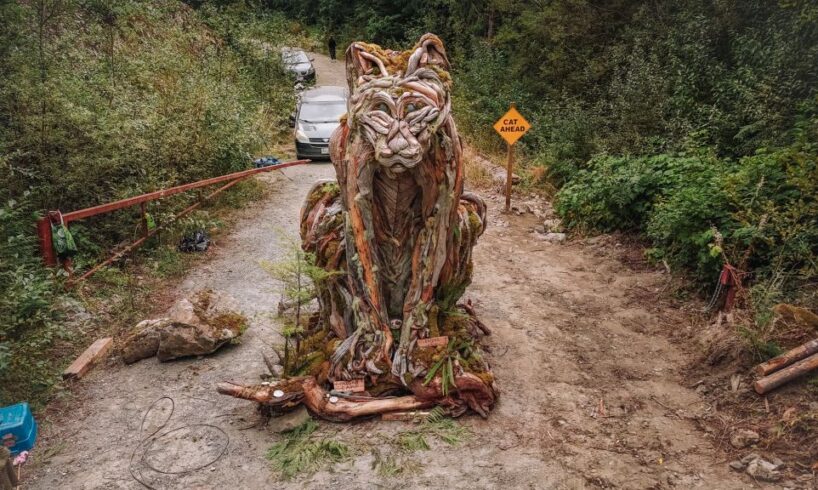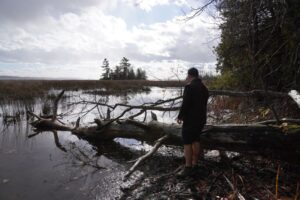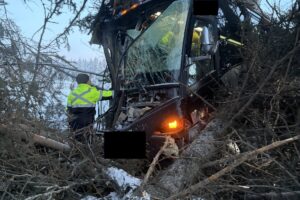
A B.C. Supreme Court justice has ordered a group of people blocking a logging road in the Walbran Valley on southern Vancouver Island to stop. The decision to grant an injunction to Tsawak-qin Forestry Limited Partnership, a joint partnership between the Huu-ay-aht First Nations and Western Forest Products, alongside an enforcement order is expected to set the stage for the RCMP to remove people from the area.
This fight over British Columbia’s old-growth forests comes four years after the start of the historic Fairy Creek protests, where more than 1,100 people were arrested.
The Walbran Valley blockade began in late August and has prevented a logging company from working and accessing tools, equipment and vehicles on the other side of the blockade. Pacheedaht Elder Bill Jones, who was at the forefront of the Fairy Creek protests, is one of the parties named in the court filing, and the only person to respond to the application. Others named include Will O’Connell, John Doe, Jane Doe and “persons unknown.”
At the blockade, people have constructed a fence which prevents vehicles from passing through. In a statement posted on Tsawak-qin Forestry Limited Partnership’s website, Pacheedaht Chief Arliss Daniels called the Walbran blockade “an unlawful obstruction,” and asked the blockaders to “immediately vacate the area.”
After hearing arguments from both sides on Sept. 9 and Sept. 11, B.C. Supreme Court Justice Amy Francis concluded on the morning of Sept. 12 that “counsel for Mr. Jones has made no effort to explain or suggest that the protesters’ conduct is legal. This is because it is illegal.”
“The court in such circumstances, has no choice but to protect the lawful conduct and business of the plaintiff, and to address the illegality of the defendant’s behaviour,” Francis said. “In these circumstances, I find the rule-of-law considerations must prevail, and the balance of convenience weighs in favour of granting the injunction.”
Five years after pledging reform, B.C. faces renewed resistance
On Sept. 9, while the Vancouver court was hearing arguments related to the injunction, The Narwhal visited what blockaders are calling Cougar Camp, where about a dozen people were gathered with tents and a sheltered kitchen area behind a fence made from rough planks of salvaged cedar. Inside the camp, a large sculpture of a cougar sat in the middle of the logging road, made from wood gathered from debris left behind by loggers. At the cougar’s paws were several small, hand-made wooden signs bearing slogans: “Defend the old growth” and “Protect the sacred.”
O’Connell was one of the people at the camp. He learned of plans to log eight parcels of land — known as cut blocks in the logging industry — in the Walbran Valley more than a year ago and told The Narwhal he had hiked the stands of trees in the valley multiple times. When he saw satellite images revealing logging had begun, he knew he would try to stop it.
“It was a wonderful clarity, because I spent five years feeling like there should be more I’m doing for the old growth,” he said. “I should be doing something because I’m feeling a continuous sadness for the loss of these places and the betrayal of the government, who is continually not acting.”
Just up the logging road from Cougar Camp lies one of the cut blocks where Tsawak-qin Forestry Limited Partnership began logging in August 2025.
The latest conflict over the future of British Columbia’s remaining old-growth trees arrives amid the fifth anniversary of the release of the old-growth strategic review, co-authored by professional foresters. It warned “the priorities that currently drive our forest management system are backwards” and urged a “paradigm shift,” offering 14 recommendations to improve forest management in B.C.
The NDP government promised to implement them all. While logging has been deferred in some of the priority areas identified in the report, old-growth trees are still being taken out of B.C. forests.
O’Connell called the B.C. government’s failure to fully implement the review panel’s recommendations and continue allowing logging in areas identified to host old-growth trees “gut-wrenching.”
“There are greater travesties happening in the world than the destruction of our last ancient forests, but this is our forest, this is our backyard and it’s something we can change and we can choose to do it differently.”
This conflict sits at the centre of a complex relationship between First Nations, the B.C. government, logging companies and environmental advocates.
B.C. court hears arguments from both sides
The request in court to stop the blockade at Cougar Camp was made by Tsawak-qin Forestry Inc and Tsawak-qin Forestry Limited Partnership to protect its permitted logging operations in the Walbran Valley from interference.
The company’s request said the Fairy Creek blockade “resulted in a significant breakdown in the rule of law” and warned the situation in the Walbran “risks spinning out of control again,” unless the court intervenes.
A statement posted on the company’s website on Sept. 8 states the Pacheedaht First Nation Chief and Council, whose territory the cut blocks are on, consented to Tsawak-qin’s plans for logging in the Walbran.
“Our planned activity incorporates specific measures to integrate cultural and ecological priorities, including the protection of culturally significant trees, support for traditional bark harvesting and respect for Indigenous Knowledge,” the statement reads.
A statement from Pacheedaht Chief Arliss Daniels included on the company’s website calls the Walbran blockade “an unlawful obstruction.”
“Blockaders must immediately vacate the area,” Daniels said. “Our lands are not to be misused or disrespected under any circumstances.”
An aerial view of one of the Walbran Valley cut blocks that Will O’Connell says he walked multiple times before logging began in August 2025.
The legal representatives for both sides made their respective cases on Sept. 9 and Sept. 11 at the B.C. Supreme Court. On Sept. 9, following a call-out for support from the Fairy Creek social media accounts, around two dozen observers sat in on the morning proceedings.
The lawyers representing Tsawak-qin argued the blockade was unlawful and undemocratic, preventing the forestry company from legal harvesting activities. The blockade put 11 forestry jobs and millions in revenue at risk, the lawyers said, at a “critical time” of year for harvesting, as the machinery can’t operate in heavy rain. Additionally, the company raised concerns about safety, saying a fire truck and emergency transport vehicle were inaccessible behind the blockade. At one point, the judge reprimanded a number of observers for laughing when the company’s lawyers once more invoked the idea of democratic process, asking them to be respectful.
A lawyer for the Tsawak-qin described the Cougar Camp as a “sophisticated, targeted and well-funded blockade” organized by the same group that carried out the Fairy Creek blockades.
Ben Isitt, the lead lawyer representing Bill Jones, argued in court the value of the forests for biodiversity and cultural survival outweigh the claims of economic harm by the logging company. The threats to life and liberty posed by climate change, the defence said, is a threat to everyone, with disproportionate impacts on the Canadian Arctic, coastal communities and Indigenous Peoples. In addition, the defence claimed Jones’s constitutional rights as an Indigenous person would be harmed, and that the ecological impacts to the forest would also cause harm to his cultural and Aboriginal Rights.
Outside of the courtroom, Isitt described the court proceedings as an “uphill battle.”
“Case law in B.C. has moved in a disturbing direction, placing more weight on the interests of industry than on Indigenous interests and ecological concerns.”
“In a planet that’s burning, it’s non-negotiable for Bill [Jones], protecting those forests. That’s the context for this dispute,” Isitt said. “And ultimately, we need the province to step in and honour its commitments.”
In her decision Justice Francis said the case is “not about the wisdom of government forest policy.”
“It is decidedly not about the court’s views on whether and where old-growth logging should occur in this province, even in the context of climate change, in an injunction application,” she said. “Those are matters outside of the constitutional competence of the courts.”
At Cougar Camp, ‘waiting for the RCMP’
Meanwhile, under a pale grey sky at the camp, several people made coffee, planned meals and watched over a toddler. Others helped to build a small cabin to offer Bill Jones and other Indigenous Elders who might visit the camp a little more comfort than a tent or vehicle. By the end of the day, the cabin would have a split red cedar door and a small wood stove.
“We’re building this whole thing up and we’re here and we’re just waiting for the RCMP to come in and destroy everything we created in terms of a community and infrastructure,” O’Connell said.
Members of Cougar Camp used slash wood salvaged from nearby cut blocks to construct a cabin for Pacheedaht Elder Bill Jones while waiting to hear the court’s decision on the injunction request.
Ahead of the court’s decision, the RCMP declined to comment on a timeline for enforcing the injunction and did not immediately respond to questions about what enforcing the injunction would look like.
The RCMP’s enforcement of injunctions against the Fairy Creek blockades was criticized by its own watchdog agency, the Civilian Review and Complaints Commission. RCMP officers took “frequent unreasonable actions” during the Fairy Creek blockades, according to the commission’s 2024 report, and used “disproportionately intrusive” methods while enforcing the injunction.
“The commission is concerned about similarly broad and intrusive strategies being implemented during future protests, leading to similarly unreasonable searches and arrests,” the report concluded.
The RCMP did not immediately respond to questions about whether any actions or changes had been undertaken in its approach to enforcing injunctions since the report was released.
In court, the defence argued the injunction filed by the logging company is too broad, putting the safety and civil liberties of people at the blockade at risk. They argued the injunction area should only apply to the forestry tenure, and that a police enforcement order was unnecessary given the small number of people at the camp. Speaking outside the courtroom, Isitt warned “there’s a very high risk that the police will act with disregard for people’s basic human rights, as they did at Fairy Creek. So, if the judge feels she must issue an order, the terms need to be narrow, need to be carefully fashioned, to limit the risk of police abuse to the greatest extent possible.”
One of Tsawak-qin’s lawyers dismissed this concern, telling the court, “The police are accountable, and there are methods for keeping them accountable.”
“Blockaders seek to avoid accountability for their unlawful acts, for taking matters into their own hands when they have a concern with public policy,” the company’s lawyer said.
Francis granted an enforcement order, but denied a clause that would have empowered the police to take “any action that is reasonably necessary to prevent persons from contravening any provision of this order.”
“I am very reluctant to endow the police with extra enforcement powers beyond those that were granted in the Teal Cedar injunction application,” she said referring to the injunction from the Fairy Creek blockade.
O’Connell recalled once thinking the Fairy Creek blockades could turn the tide. But the hope that blocking logging roads will actually save ancient trees has receded to a trickle.
“We all did everything we could,” he told The Narwhal. “It’s just hard to be here expecting to lose and still doing it.”
— With files from Zoë Yunker, Michelle Cyca and Lindsay Sample





